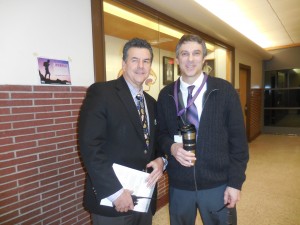WESTFIELD – More than fifty seniors and juniors from Westfield Technical Academy are at businesses throughout Westfield and in neighboring communities, working in their career/vocational technical education programs, or “coops.”
“They’re everywhere,” said Peter Taloumis, career technical education director for the school.

Student services coordinator Rob Ollari and career technical education director Peter Taloumis work with Westfield Tech students to obtain coops. (Photo by Amy Porter)
Taloumis said students qualify for coops after 1 1/2 years learning compentencies in a technical shop. That means the earliest students can qualify is in the second half of their junior year, because all of ninth grade is considered an exploratory year,
Students must have an instructor’s recommendation in their career technical area, and an academic recommendation, as well as a GPA of 70 in order to qualify. Some shops, such as Electrical Wiring, require a GPA of 80 to go out on coop, he said. Workplace readiness skills are also taught and considered part of the competencies. If students have a poor attendance record, for example, or are always late, they won’t be placed.
Rob Ollari, student services coordinator, said the goal is to place all of the students. “They have to meet the competencies,” Ollari said, adding, “All students have the ability to qualify for cooperative education.”
At Westfield Technical Academy, students alternate between one week of career technical programs (aka Shop Week) and one week of academics. Students are allowed to work during the school day of shop week for a minimum of 30 hours, and a maximum of 48 hours. Students get paid qualifying wages at coops. In some cases, it could be minimum wage, Taloumis said. In the case of state jobs, students are paid the prevailing wage, which is higher than minimum.
Under Commonwealth law, if every student met the criteria, they could go out. Ollari said that in Massachusetts, coops have very specific guidelines under Chapter 74 regulations with the state Department of Elementary and Secondary Education (DESE).
Taloumis gave an example, saying that a 17-year-old culinary student on a coop could use a meat slicer at a market with an exemption for his age, whereas a regular student under 18 could not.
Ollari said the greatest difficulty is balancing qualified students and site placements. Currently he has 12 qualified juniors from Business Technology who he is trying to place, and he is looking for opportunities. If an employer has one or two positions, he will send four out for interviews.He said students bring training in accounting, customer relations, MicroSoft Office, Desktop publishing, and invoicing to the job. He has already placed six at Westfield G&E, in the city’s water department and technology center.
The manufacturing field, on the other hand, requests students weekly. He said the Manufacturing Tech shop doesn’t have enough students to fill the slots, and pretty consistently has 100% placement in coops every year.
Other shops, Taloumis said, don’t want students to leave the first half of the year when they are doing peer mentoring, working with lower classrooms and freshmen exploratory. Manufacturing keeps its students in class until the summer after their junior year, to learn the CNC curriculum and be better prepared for the workplace. Each shop runs their program a little differently, he said.
Taloumis and Ollari quickly ran down some of the local businesses that offer coops, adding that they didn’t want to forget anybody. Some companies have a history of taking coop students, they said. Aero Fastener, for example, has eight former to current students at their shop right now- three alumni who work there, and five coop students. Two students in Graphic Design are working with two facilities in Holyoke, one for embroidering and one that makes t-shirts.
Information Technology just placed two students at Mestek, two at Westfield Bank to assist with the merger, one at Big Voodoo in Holyoke, and one at Westfield G&E, starting on Monday, along with four juniors at Aero Fastener.
Also placing strong are Auto Technology students, most recently with Balise Lexus. Advanced Manufacturing also has two coop students right now, as does Jarvis Surgical and Peerless Precision.
“A lot of companies have been great supporters of our program. We try to supply them with a skilled workforce. The bridge to that full-time employment is a coop position. Typically, what begins with a coop turns into a full-time, permanent position,” Ollari said.
“They take good care of our kids, and oftentimes support post-secondary education in some way,” Taloumis added.
“We try to create a very specific prescribed pathway for students into the workforce. Now, they’re adding college to it,” Ollari said. He explained that in some of the shops, students can earn articulation credit, which is college credit for the work they’ve already done in shop. Manufacturing students for example have up to 15 credits at STCC upon graduation, and the Information Technology department has 24 credits that can be earned.
In addition to coops, there are also internships available at companies. With an internship, a student is able to go to a facility for a week or two for the experience. Internships are unpaid positions. Ollari said if a company is interested in placing a student, it might start with an internship. It’s a way into the program.
Taloumis said right now, the Council on Aging has Tuesday and Thursday and the Press Room has Tuesday through Thursday internships . He said internships are very flexible, unlike coops. The school is looking for more businesses to participate in offering internships, as well.
Ollari said one of the important aspects of the program is getting students invested in the community. “The majority of our students stay in Westfield, and buy in Westfield,” he said.

